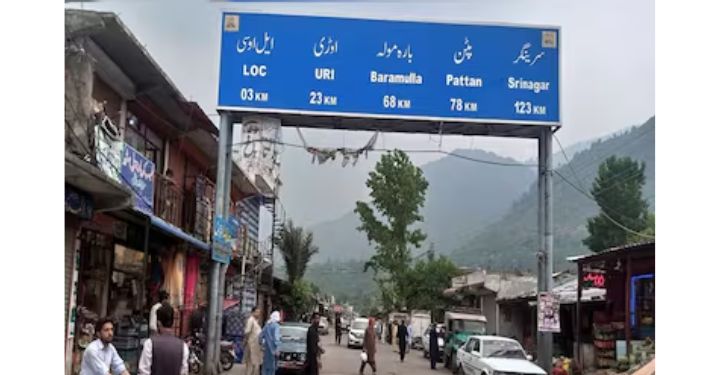Amid escalating tension along the Line of Control (LoC), Indian Army troops detained a teenage Pakistani national in Jammu and Kashmir’s Poonch district this week, prompting a region-wide security review and heightened surveillance.
The individual, identified as 18-year-old Mohd Sadiq, reportedly crossed into Indian territory near the Noorkote area under Mendhar subdivision of Poonch late Wednesday evening. Army sources said that the youth was spotted by a patrol unit during a routine search operation along the border. He was found unarmed, and no contraband or incriminating materials were recovered from him at the time of arrest.
Though preliminary questioning suggested that the individual may have crossed the border by accident, Indian security agencies are not taking the incident lightly. Officials have confirmed that a full-scale joint interrogation by Army intelligence, the Jammu and Kashmir Police, and central agencies is underway to rule out any possible links to terrorist or reconnaissance missions.
“This is a highly sensitive zone. Every movement along the LoC is scrutinized because of the history of infiltrations and the current high-alert situation,” said a senior army official deployed in the Poonch sector.
The LoC, a de facto border between India and Pakistan in Jammu and Kashmir, is frequently the site of infiltration attempts, cross-border firing, and ceasefire violations. Though both countries agreed to a ceasefire reaffirmation in early 2021, numerous incidents since then have challenged the fragile peace.
This latest arrest comes against the backdrop of the April 22 terror attack in Pahalgam, which left 26 dead, including 25 Indian civilians and one Nepali national. The Indian government has alleged that the attack was carried out by militants affiliated with Pakistan-based groups, escalating bilateral hostilities.
In response to the rising threat perception, Indian forces have significantly stepped up operations along infiltration-prone corridors in the union territory. Senior defense officials confirmed that real-time monitoring, drone surveillance, and layered human intelligence operations are being ramped up, especially in districts like Poonch, Kupwara, and Baramulla.
“This arrest may or may not be linked to militant activity. But we cannot afford to let our guard down,” said a high-ranking officer in India’s Northern Command.
According to sources familiar with the case, the detained youth claimed during interrogation that he crossed the LoC while grazing cattle and got lost. While such incidents have occurred before, what complicates this particular case is the location of the arrest—an area not typically used for civilian movement on either side.
Experts argue that individuals crossing over can be exploited as couriers, lookouts, or decoys. In several past instances, teenage boys or young men were caught smuggling messages, money, or logistical support to sleeper cells on the Indian side. Consequently, each arrest is examined not just as a border breach, but as a possible node in a larger security matrix.
As the youth remains in military custody, Indian agencies are verifying his identity, checking communication records, and probing any prior movement along the LoC. Officials are also scanning intelligence inputs from the past few weeks to see if the arrest coincides with any reported infiltration plans or group movements from across the border.
On the diplomatic front, New Delhi has not yet approached Islamabad regarding consular access or possible repatriation. Ministry of External Affairs sources say such communication will only be initiated after security agencies complete their inquiry and conclusively determine the nature of the intrusion.
India has repatriated Pakistani civilians in the past—especially in proven cases of inadvertent crossing—but only after ensuring there is no involvement in subversive activity. The current security environment, however, might delay or even derail such processes.
Locals in Poonch, a region frequently caught between armies, have responded with mixed emotions. “We always fear that one incident will lead to more troops, more checkpoints, and more fear,” said Bashir Ahmed, a teacher in Mendhar. “But we also know that the Army has to be alert. The peace here is always fragile.”
Meanwhile, political voices from both national and regional parties have called for transparency in the investigation. Some have urged authorities to handle the matter with humanity if the boy is found to be innocent. Others have argued that India must maintain a firm posture, especially after the recent terror attacks.
Retired military analysts suggest that the situation presents both a challenge and an opportunity. “We must find out the truth behind the crossing,” said Lt Gen (Retd) Deepak Dwivedi. “If it’s an innocent mistake, repatriation should be considered to show moral strength. If not, it must be dealt with firmly.”
Until then, the Pakistani national will remain in custody, and security forces will continue their combing operations along the LoC. This case will likely feed into a broader assessment of infiltration strategies being adopted by Pakistan-based groups and inform counter-infiltration tactics going forward.
The arrest, though involving just one individual, is a reminder of the complexities along the India-Pakistan border—a space where geopolitical, military, and human realities often collide in unpredictable ways.
For More News updates : https://asiapedia.in
